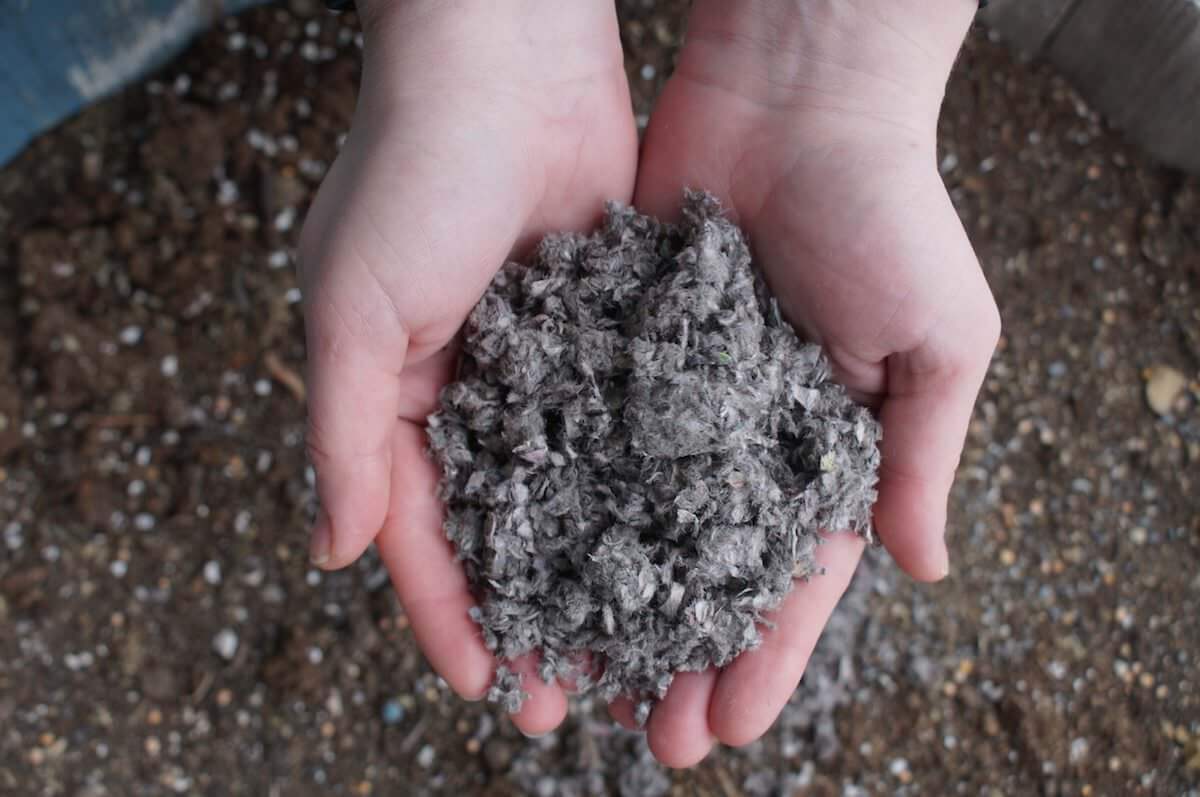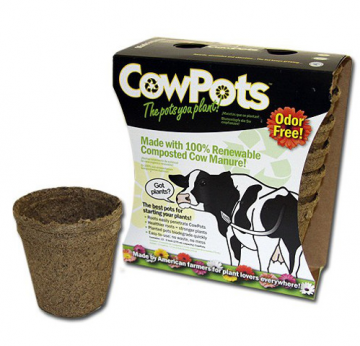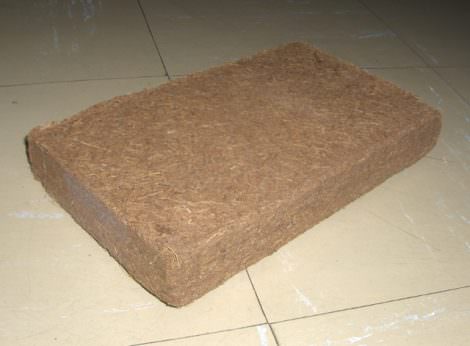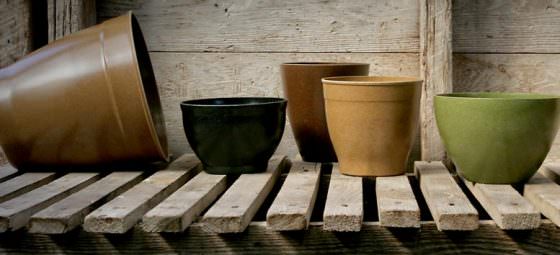Here Are Six Sustainable Products for Starting Your Spring Seeds
Minimize your footprint while growing your seeds with these sustainable gardening products.
Here Are Six Sustainable Products for Starting Your Spring Seeds
Minimize your footprint while growing your seeds with these sustainable gardening products.

Before we begin, it’s worth mentioning that quality, organically produced, heirloom seeds from places like Seed Savers Exchange and the Hudson Valley Seed Company should be your starting point – you can’t expect to start with a bad product and get a good result. Once you’ve secured those, let’s get planting!
Seed Trays and Pots

Plastic seed trays and pots have been the standard for decades, but plastic is slow to break down, adds to landfills and can leach toxins into the ground. Some more sustainable solutions include Cowpots and Fertilpots. Both plantable, Cowpots are made from cow manure and natural fibers, while Fetilpots are made from wood fiber. They come in a variety of sizes, including trays. Once the seedling is ready to be transplanted, the pot can go straight into the ground – the plants can grow through the material – helping to get the seedling through the often traumatizing effects from moving out of its starter container. An added benefit of Cowpots: as the pot degrades, the manure provides nutrients for the soil.
Sphagnum peat moss – the main ingredient in most potting soil mixes – has environmental issues since it comes from peat bogs – wet deposits of partially decayed plants – that hold nearly one-third of the world’s terrestrial carbon stores, and their harvesting can release this greenhouse gas into the atmosphere. Commercial peat moss harvesters, especially those in Canada, argue that their product is sustainable if well managed. Either way, many gardeners are moving away from peat moss and there are several products that can replace it.

One option is Coir – pronounced “kwaher” – the fiber from the coconut husks. It’s a renewable resource, drains well and requires less water than other potting soil materials. Many indoor farms are using coir, but it’s use isn’t limited to large-scale businesses. There several products on the market for the home gardener that use coir as the basis for their potting mixes, including Eco-Co’s Coir seed starting mix, or you can make your own.
PittMoss, a product made from recycled paper, is another peat moss-free option. Featured on the ABC TV show Shark Tank in April 2015, this is its first year on the market for non-commercial growers. According to the company, their product allows for more air, more water, and more nutrients to be absorbed to your plants, encouraging higher yields and strong performance under stressful conditions.
Rice hulls, the hard outer layer of rice, has been used by some commercial indoor growers since the ’70s. Rice hulls are a renewable resource, drain well, and can be mixed with compost for a great seed-starting mix.
Planters
Once you have some healthy little seedlings, it’s time to transfer them into a planter and there are some decisions to make. One option is EcoForms: sustainably-produced planters made out of rice hulls and other grain byproducts and natural binders. Ceramic planters look great but can be pricey and EcoForms’ pots, while a bit more expensive than plastic planters, cost less than ceramic ones and come in a variety of colors, shapes, and sizes. They’ll last about five years outdoors and can then be composted.

Follow us
This work is licensed under a Creative Commons Attribution-NoDerivatives 4.0 International License.
Want to republish a Modern Farmer story?
We are happy for Modern Farmer stories to be shared, and encourage you to republish our articles for your audience. When doing so, we ask that you follow these guidelines:
Please credit us and our writers
For the author byline, please use “Author Name, Modern Farmer.” At the top of our stories, if on the web, please include this text and link: “This story was originally published by Modern Farmer.”
Please make sure to include a link back to either our home page or the article URL.
At the bottom of the story, please include the following text:
“Modern Farmer is a nonprofit initiative dedicated to raising awareness and catalyzing action at the intersection of food, agriculture, and society. Read more at <link>Modern Farmer</link>.”
Use our widget
We’d like to be able to track our stories, so we ask that if you republish our content, you do so using our widget (located on the left hand side of the article). The HTML code has a built-in tracker that tells us the data and domain where the story was published, as well as view counts.
Check the image requirements
It’s your responsibility to confirm you're licensed to republish images in our articles. Some images, such as those from commercial providers, don't allow their images to be republished without permission or payment. Copyright terms are generally listed in the image caption and attribution. You are welcome to omit our images or substitute with your own. Charts and interactive graphics follow the same rules.
Don’t change too much. Or, ask us first.
Articles must be republished in their entirety. It’s okay to change references to time (“today” to “yesterday”) or location (“Iowa City, IA” to “here”). But please keep everything else the same.
If you feel strongly that a more material edit needs to be made, get in touch with us at [email protected]. We’re happy to discuss it with the original author, but we must have prior approval for changes before publication.
Special cases
Extracts. You may run the first few lines or paragraphs of the article and then say: “Read the full article at Modern Farmer” with a link back to the original article.
Quotes. You may quote authors provided you include a link back to the article URL.
Translations. These require writer approval. To inquire about translation of a Modern Farmer article, contact us at [email protected]
Signed consent / copyright release forms. These are not required, provided you are following these guidelines.
Print. Articles can be republished in print under these same rules, with the exception that you do not need to include the links.
Tag us
When sharing the story on social media, please tag us using the following: - Twitter (@ModFarm) - Facebook (@ModernFarmerMedia) - Instagram (@modfarm)
Use our content respectfully
Modern Farmer is a nonprofit and as such we share our content for free and in good faith in order to reach new audiences. Respectfully,
No selling ads against our stories. It’s okay to put our stories on pages with ads.
Don’t republish our material wholesale, or automatically; you need to select stories to be republished individually.
You have no rights to sell, license, syndicate, or otherwise represent yourself as the authorized owner of our material to any third parties. This means that you cannot actively publish or submit our work for syndication to third party platforms or apps like Apple News or Google News. We understand that publishers cannot fully control when certain third parties automatically summarize or crawl content from publishers’ own sites.
Keep in touch
We want to hear from you if you love Modern Farmer content, have a collaboration idea, or anything else to share. As a nonprofit outlet, we work in service of our community and are always open to comments, feedback, and ideas. Contact us at [email protected].by Andrew Amelinckx, Modern Farmer
April 25, 2017
Modern Farmer Weekly
Solutions Hub
Innovations, ideas and inspiration. Actionable solutions for a resilient food system.
ExploreExplore other topics
Share With Us
We want to hear from Modern Farmer readers who have thoughtful commentary, actionable solutions, or helpful ideas to share.
SubmitNecessary cookies are absolutely essential for the website to function properly. This category only includes cookies that ensures basic functionalities and security features of the website. These cookies do not store any personal information.
Any cookies that may not be particularly necessary for the website to function and are used specifically to collect user personal data via analytics, ads, other embedded contents are termed as non-necessary cookies.
Would like to join the modern farmer.Its a push to farming.